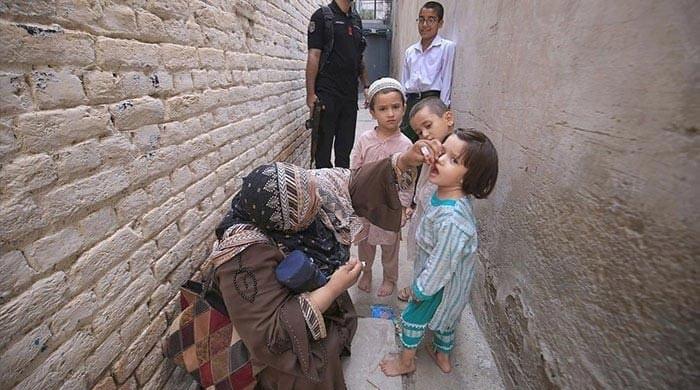- Pakistan reports 26 polio cases this year.
- Most cases reported by Khyber Pakhtunkhwa.
- Polio virus detected in wastewater samples of 127 districts.
Pakistan will launch a new anti-polao campaign nationally on September 1 in three provinces, while in Punjab, the campaign will start on September 10.
The Federal Minister for National Health Services, Regulations and Coordination Syed Mustafa Kamal, accompanied by the chief of MQM-Pakistan, Anis Qaimkhani, held a press conference at his camp office in Karachi on Friday concerning the next national campaign in Polio and the floods in Pakistan.
Addressing the supplier, he said that the polio virus had been detected in sewer samples of 127 districts across the country, including all Karachi districts.
He said that out of the 26 cases reported this year, 16 came from Khyber Pakhtunkhwa, with 13 emerging southern KP where security challenges had hampered vaccination efforts.
Meanwhile, the National Emergency Operations Center (NEOC) postponed the polio vaccination campaign in nine Punjab districts due to the current flood situation.
The campaign has been postponed to Lahore, Sheikhupura, Kasur, Okara, Gujranwala, Sialkot, Multan, Muzaffargarh and Bahawalpur. Meanwhile, Polio Drive will continue as planned in Rawalpindi, Mianwali, Faisalabad and Dera Ghazi Khan.
In Attock, Rajanpur and Rahim Yar Khan, the vaccination campaign will take place as planned.
Stressing the severity of the situation, Kamal said: “The only solution to protect the children from Polio is the repeated administration of Polio drops. All religious scholars and madrasas have declared the safe of the vaccine, and we must depoliticize the fight against polio. Afghanistan and Pakistan will carry out polio policy, and with joint efforts, we will soon eliminate the Polio country.
The Minister of Health also stressed that Karachi’s parents show the highest resistance to polio vaccination. He noted that door-to-door campaigns were underway through Pakistan.
Turning to the situation of floods in the country, Kamal said that the government had responded to all requests for medication and medical equipment in the floods. He said that federal and provincial governments are in constant coordination, while a command and control room was created at the National Institute of Health (NIH) to monitor the situation. He added that NDMA teams are in close contact with the Ministry of Health.
Kamal stressed that natural disasters cannot be discussed alone by provincial or federal governments and have called for strengthening the local government system, which he called the most effective mechanism for disaster management.
“Our country works under provincial and federal structures, but disasters of such magnitude cannot be managed without authorized local organizations. We need administrative reforms and creating new units on administrative reasons, and not to divide the country but to strengthen governance and ensure delivery at local level. ”
The Minister added that if the provinces have received collectively 8,700 billion rupees, there is no mechanism to ensure that resources decrease at the lowest level. He called for transparent planning and effective use of funds.




